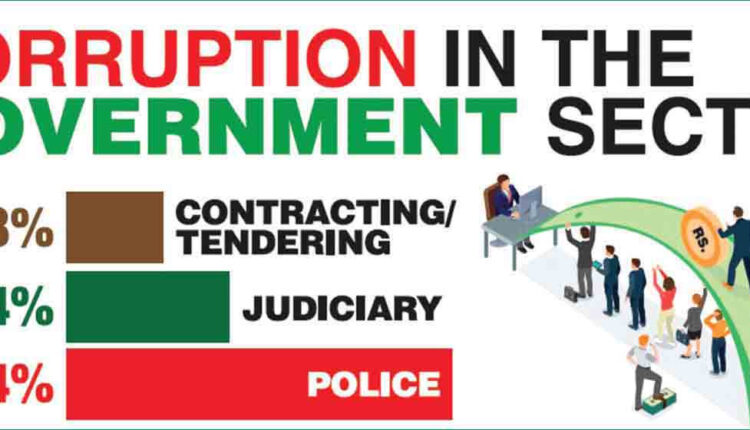Transparency International survey finds Pakistan police and judiciary most corrupt institutions

Karachi: In the last 20 years, Transparency International has conducted National Corruption Perception Surveys five times: NCPS 2002,NCPS 2006, NCPS 2009, NCPS 2010 and 2011.In 2021, TI Pakistan has conducted National Corruption Perception Survey 2021 in all fourprovinces. The survey was held from 14 October 2021 to 27 October 2021.The survey is the perception of general public on very important governance issues.
The key findings are:
1. National Corruption Perception Survey 2021 has revealed that police remains the mostcorrupt sector, Judiciary was seen as 2nd most corrupt, Tendering and Contracting 3rd mostcorrupt while Health has climbed to become 4th most corrupt since the last NCPS 2011.According to Judicial Statistics of Pakistan 2020 report by National Judicial (Policy Making) Committee, there are 46,698 cases pending in Supreme Court and 1,772,990cases pending in District Judiciary.1
2. Vast majority 85.9% of people considered Federal government’s self-accountability to beunsatisfactory.
3. Pakistanis continued to believe that the corruption in government sector is high. Police(41.4%), Judiciary (17.4%) and Contracting/Tendering (10.3%) according to the citizensare three most corrupt sectors, while contracts of roads (59.8%), cleanliness and garbagecollection (13.8%), access to water (13.3%) and drainage system (13.1%) top the list ofpublic services for which to have access people have to pay bribes.
4. Three most important causes of corruption, according to NCPS 2021 are Weak Accounta-bility (51.9%), Greed of Powerful People (29.3%) and Low salaries (18.8%).
5. As measures to reduce corruption, 40.1% Pakistanis say increase/stringent punishmentsfor corruption cases, 34.6% Pakistanis say accountability of public officers by expediting NAB’s handling of corruption cases, and 25.3% say complete ban on those convicted incorruption from holding public office, are key to combat corruption in Pakistan.
6. The survey also sheds a light on local government and how its presence could have helpedPakistan establish a firmer grip on the situation arising out of Covid-19.
7. About 47.8% of Pakistanis considered that if local government elected representativeswere in place, Covid-19 public awareness campaigns could have been launched in an ef-fective manner.
8. Large population of Pakistanis (72.8%) who believe that public sector corruption at thegrassroots levels has increased due to the absence of local government.
9. 89.1% of Pakistanis have said that they did not pay any bribe to any government officialduring the federal government’s Covid-19 relief efforts for the deserving citizens.
10. A significant population (81.4%) has declined that they willingly pay bribe and likewise itwas a clear perception that bribes are rather extorted from the public through tactics suchinaction or delay, in the provision of public services.
11. Compared to the three federal governments, majority of Pakistanis (92.9%) consider infla-tion and price hike to be highest in the current PTI government (2018-2021), compared to4.6 % in PML N government (2013-2018) and 2.5% in PPP government (2008-2013).
12. This coincides with 85.9% Pakistanis who say that their income levels have rathersqueezed and decreased during the last three years.
13. The main reasons citizen’s accord to the rising inflation and unemployment are: Govern-ment Incompetence (50.6%), Corruption (23.3%), Undue Interference of Politicians ingovernment affairs (9.6%) and Lack of implementation of policies (16.6%).
14. The majority Pakistanis (66.8%) say that the present government’s accountability drive is partial.
